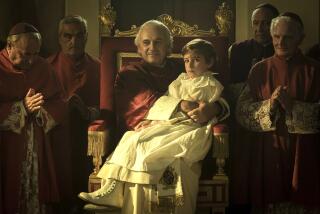Gestures of Love in ‘We Laughed’
- Share via
To watch Gianni Amelio’s luminous “The Way We Laughed” is to reconnect with Italian cinema in all its richness of emotion and command of expressive gesture.
In such widely acclaimed films as “Stolen Children” (1992) and “Lamerica” (1994), Amelio revealed that he was a superb artist who harkened back to the openhearted, socially conscious yet exquisitely subtle neo-Realist tradition of Vittorio De Sica, but here his style is elliptical as never before.
He deliberately leaves out sizable chunks of narrative, which emphasizes what is important to him while inviting us to fill in the blanks with our own conjectures. The ultimate effect is of a cumulative, heightened impact from a filmmaker who already was master at telling a wrenching tale.
Amelio, his superb cinematographer Luca Bigazzi and evocative composer Franco Piersanti plunge us into a world in which darkness is as richly textured as light.
In the darkness the radiant face of Enrico Lo Verso comes into view. It is a face familiar to those who’ve seen “Stolen Children,” in which he played a military man charged with transporting two small children to a distant orphanage only to develop a paternal love for them. In “Lamerica,” he was a ruthless capitalist eager to exploit the fall of communism in Albania.
He’s a little too gaunt to be truly handsome, which is a plus, for this makes it easier to identify with him as an ordinary guy who gets caught up in extraordinary circumstances.
“The Way We Laughed” unfolds in six sequences set between 1958 and 1964, a time of profound change as Italy was shifting, often painfully, from a society with a large agrarian population to one with an urban, industrialized base.
Lo Verso’s Giovanni is a Sicilian peasant who has come to Turin to ensure that his younger brother Pietro (Francesco Giuffrida, an actor equal to the formidable Lo Verso), a student, gets the education that the illiterate Giovanni considers all-important in these changing times.
Giovanni, 12 years older than Pietro, has a paternal love that borders on obsessive.
No sacrifice is too great, no work too lowly; what Giovanni can’t see is that Pietro, while bright, is indolent. Even when Giovanni realizes how poor a student Pietro has been, he is willing to help him at any cost.
Pietro is not, however, unmoved by his older brother’s self-sacrificing love, but it threatens to suffocate him.
When Pietro disappears from Giovanni’s life for awhile, we see Giovanni’s survival skills. He all but unconsciously develops leadership and organizing skills that serve him well through various political upheavals. He has the stuff to succeed in a burgeoning economy and to develop the confidence to learn to read and write, while Pietro’s destiny remains a question mark.
All the while Amelio is unobtrusively building “The Way We Laughed” toward a conclusion that evokes themes of corruption and redemption. The film’s impact is shocking and charged with the full-bodied emotion seemingly so intrinsic to the Italian nature. This sweeping, confounding conclusion therefore unfolds with a beauty and an ease that seem truly organic. “The Way We Laughed” has that feeling of being a work of art.
*
Unrated. Times guidelines: The film has complex adult themes, some language and violence.
‘The Way We Laughed’
Enrico Lo Verso...Giovanni
Francesco Giuffrida...Pietro
Fabrizio Gifuni...Pelaia, the educator
Rosaria Danze...Lucia
A New Yorker Films release. Writer-director Gianni Amelio. Producers Vittorio and Rita Cecchi Gori. Executive producer Mario Conte, Pacific Pictures. Cinematographer Luca Bigazzi. Editor Simona Paggi. Music Franco Piersanti. Costumes Gianna Gissi. Production designer Nello Georgetti. In Italian, with English subtitles. Running time: 2 hours, 8 minutes.
Exclusively at the Music Hall, 9036 Wilshire Blvd., Beverly Hills, (310) 274-6869.
More to Read
Only good movies
Get the Indie Focus newsletter, Mark Olsen's weekly guide to the world of cinema.
You may occasionally receive promotional content from the Los Angeles Times.








